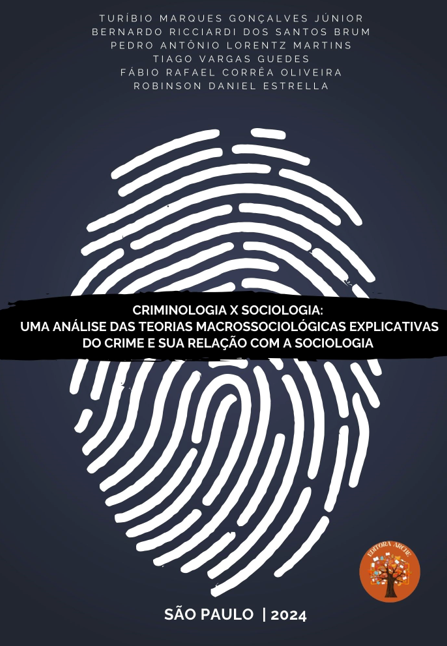CRIMINOLOGY X SOCIOLOGY: AN ANALYSIS OF MACROSOCIOLOGICAL THEORIES EXPLANATORY OF CRIME AND THEIR RELATIONSHIP WITH SOCIOLOGY
Keywords:
Criminology. Criminal Sociology. Macrosociological Theories.Abstract
Noble readers,
This digital book delves into the relationship between criminology and sociology, unveiling macrosociological theories that shed light on the complexities of crime and its associations.
Criminology, sociology and macrosociological theories are intrinsically related, as they all seek to understand human behavior in society, including the occurrence of crime and deviance.
Criminology is dedicated to the study of crime, its causes, consequences and forms of prevention, focusing on the individual and the psychosocial processes that lead them to commit criminal acts.
In turn, sociology investigates the structures, institutions and social relationships that shape human behavior in broader social contexts. She will understand how factors such as social class, gender, education, among others, influence social interactions and, consequently, the occurrence of crime.
Macrosociological theories, in turn, are those that focus on explaining crime based on broader social phenomena and structures, such as social inequality, class conflict, labeling processes and anomie. They seek to analyze how these macro-level factors influence crime rates and patterns of deviant behavior in a society.
Thus, criminology, sociology and macrosociological theories complement each other, offering a holistic and multifaceted view of crime and deviant behavior, which considers not only individual aspects, but also broader social and structural contexts.
After this preamble, the book strives to bring an interdisciplinary approach, exploring the intricacies in which these areas intertwine to offer a more complete understanding of the social phenomena that permeate the world of crime.
The book chooses criminology as the starting point of this journey, revealing the intricacies of criminal behavior. Among the topics covered, the following stand out:
Chicago School: A milestone in the history of criminology, this school of thought laid the foundations for the study of urban crime, highlighting the influence of the social environment in the production of deviant behaviors.
Differential Association Theory: Proposed by Edwin Sutherland, this theory explores how interaction with groups that endorse criminal norms can shape individual choices.
Anomie Theory: Inspired by Émile Durkheim and expanded upon by Robert Merton, this theory examines imbalances between cultural goals and legitimate means to achieve them, leading to innovation and deviant adaptation.
Delinquent Subculture Theory: This theory highlights the existence of subcultures that value and promote criminal behaviors as a response to unfavorable social conditions.
Next, the book presents criminal sociology, complementing this analysis, offering a broad view of the social contexts of crime. In this topic, the book discusses the Labeling Theory: This theory argues that the labeling of individuals as criminals can lead to the internalization of this label and an increase in deviant behavior.
It then presents Situational Theories, examining how characteristics of the immediate environment influence individual choices related to crime. Critical or Radical Theory: This perspective highlights structural inequalities as generators of crime and questions institutions of social control as instruments of oppression.
At the end of this intellectual journey, we are confronted with the complexity and interconnection between criminology and sociology. The macrosociological theories examined in this digital book show us how social structures, labeling processes, and situational conditions shape and influence deviant behavior. This work is an invitation to continue exploring and deepening this fascinating field of study, thus enriching our understanding of crime and society.
Happy reading to everyone,
The authors
Downloads

Downloads
Published
How to Cite
License
Atribuição CC BY
